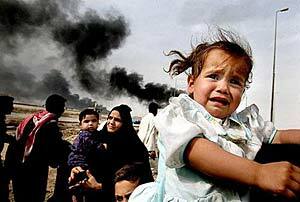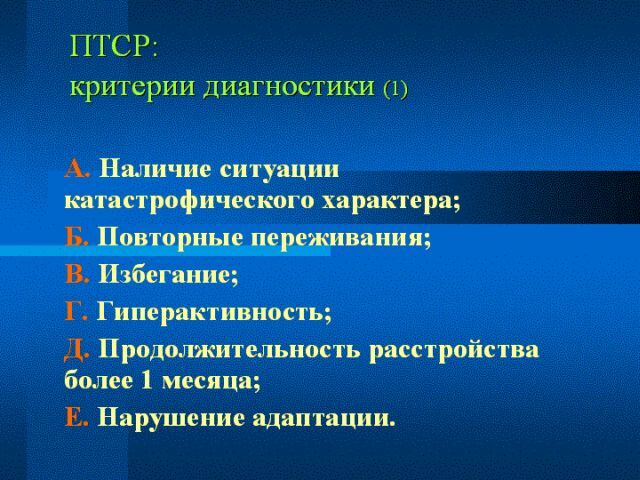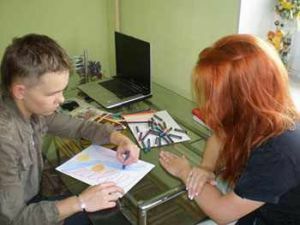 A person's psyche can be exposed to various shocks. Traumatic events that go beyond the experience and representation of a person leave an indelible impression and are capable of causing such reactions as a prolonged depressive state, isolation, fixation on the situation.
A person's psyche can be exposed to various shocks. Traumatic events that go beyond the experience and representation of a person leave an indelible impression and are capable of causing such reactions as a prolonged depressive state, isolation, fixation on the situation.
Post-traumatic stress disorder( PTSD, PTSD) is a person's severe reaction to a situation that is psychotraumatic. A similar condition is manifested in painful abnormalities in behavior that persist for a long period.
Post-traumatic stress suggests that a person is faced with a traumatic event or situation that has a negative impact on his psyche. The traumatic event is significantly different from all other events that the victim had to face before and causes him considerable suffering.
Depending on how severe the shock was, the disorder can persist for several hours to several years.
Contents of
- What can be a traumatic factor?
- Clinical picture
- Returning to a traumatic event, re-experiencing it
- Avoiding a traumatic situation
- Psychological and emotional disorders
- Diagnosis of a disorder
- Goals and methods of treating a disorder
- What can it all end with?
What can be a traumatic factor?
As a traumatic situation, military conflicts may occur( therefore sometimes PTSD refers to the Afghan or Vietnamese syndrome, military neurosis) natural, man-caused and other kinds of accidents, accidents, especially fatalities, physical violence, forced observation of someone else's death.
Post-traumatic stress is characterized by a wavy course, but in some cases it becomes chronic and provokes a persistent personality change.
The mental state of the victim is unstable and characterized by a whole range of abnormalities, ranging from insomnia and anxiety and ending with bouts of unmotivated rage and thoughts of suicide.
Post-traumatic stress disorder is triggered by the following factors:
- situations that have a traumatic effect on the psyche ( death of close people, military actions,
 terrorist acts, physical violence, natural disasters, assault, attempt on life) - while a person can be either directlyparticipant of similar situations, and the forced observer;
terrorist acts, physical violence, natural disasters, assault, attempt on life) - while a person can be either directlyparticipant of similar situations, and the forced observer; - presence of child psychological trauma ;
- hereditary factors - mental illness, suicide, chronic alcoholism or drug abuse of a close relative;
- presence of concomitant diseases of the nervous or endocrine systems ;
- Obtaining injuries, severe injury ;
- news of a severe or terminal illness ;
- is a product of severe medical manipulations of , in particular - surgical interventions( especially traumatizing this factor is for children).
Specialists, drawing on statistical data, came to the following conclusions:
- , 60% of people affected by violent actions develop posttraumatic shock;
- when beaten with severe consequences, the disorder occurs in about 30%;
- 8% of people who witnessed murders and violent actions are at risk of developing PTSD.
To the greatest extent, people with poor mental health are predisposed to the development of post-traumatic stress disorder, as well as those who too closely perceive events occurring around the event.
In children, the risk of developing such a disorder is more likely than in adults.
Clinical picture
Post-traumatic stress disorder in different people can manifest in different ways and have different symptoms: an emotional explosion is injected suddenly or gradually, with the disappearance of symptoms after a while or, conversely, with the increase in their severity.
There are three main groups of symptoms of the disorder, which, in turn, include several manifestations.

Returning to a traumatic event, re-experiencing it
This group includes a set of such symptoms:
- sensation of a strong emotional stress, when a person remembers about what he has experienced;
- memories of the event haunt a person, it is impossible to get rid of them with all the diligence of the victim;
- the presence of physiological reactions in response to memories of a traumatic event( intense sweating, nausea, increased respiration and palpitations);
- dreams that once again make the victim experience the situation;
- phenomenon of "overtraining"( hallucinations), a person feels as if the traumatic event is repeated again and again in real time and behaves accordingly to the imaginary situation.
Avoiding the traumatic situation
The next group is trying to avoid reminders of a watershed event. This includes such symptoms:
- avoiding everything that reminds the victim of the situation: places, feelings, thoughts, things;
- apathy and loss of interest in life after a traumatic event, lack of thoughts about the future and the opportunities associated with it;
- the inability to recall individual moments of an event.
Psychological and emotional disorders
The last group of symptoms of PTSD is associated with manifestations of emotional and mental disorders:
- sleep problems( insomnia, waking up in the middle of night, nightmarish dreams);Outbreaks of anger and irritability;
- nervousness, emotional excitability;
- the inability to concentrate on anything;
- panic attacks;
- aspiration for comprehensive control;
- irritability and unmotivated outbursts of anger;
- thoughts of suicide;
- feeling of distrust towards others;
- sensation of shame and guilt;
- self-flagellation;
- prolonged depressive conditions;
- is hopeless, lack of confidence in the future;
- violation of social adaptation.
In some cases, the shock is so strong that a person experiences severe physical pain and tension. Sometimes the victim tries to forget himself, to distract himself from the haunting thoughts and memories, for the purpose of which he uses narcotic substances, alcohol, nicotine.
In children and adolescents, clinical post-traumatic stress disorder may also include such symptoms:
- a fear of parting with parents, being away from them;
- sudden loss of acquired skills( including - household level);
- development of new phobias on the basis of nervous breakdown;
- enuresis;
- is a return to behavior that is characteristic of young children.
Diagnosis of the
disorder To diagnose a specific condition, such as a post-traumatic syndrome, it is necessary for specialists to determine how many of the symptoms characteristic of it are observed in the patient. There must be at least three of them, and their duration should not be less than a month.
If symptoms are observed for less time, not PTSD, but acute stress disorder is diagnosed.
During the diagnostic procedures the psychiatrist should exclude the possibility of other syndromes in the patient, which could appear after a traumatic event. Collecting a detailed anamnesis is the basis, starting from which, it is possible to put or refute the diagnosis.

Objectives and methods of treatment of
disorder Treatment of such a complex disorder as posttraumatic stress disorder has the following objectives:
- to convey to the patient who believes that no one has ever encountered such a problem before him, the essence and typicality of mental experiences that will help the patient realizethat he is completely normal and can consider himself a full member of society;
- help a person restore his right personality;
- to return a person to society by teaching communication skills;
- make the symptoms of the disorder less expressive.
 Treatment of PTSD is performed by a psychiatrist or psychotherapist. It must necessarily be complex.
Treatment of PTSD is performed by a psychiatrist or psychotherapist. It must necessarily be complex.
The basis of treatment is psychotherapy. Initially, a specialist should establish a trusting relationship with the patient, otherwise a full-fledged treatment is simply impossible.
In the future, the therapist applies techniques that help the patient to take a hard life experience, rework it, in other words - to reconcile with the past.
Such methods of psychotherapy are used:
- suggestion( hypnosis);
- relaxation( eg, by performing breathing exercises);
- autosuggestion( auto-training);
- expression by the patient of emotions through visual arts;
- help the victim in creating a clear picture of the future.
The duration of such treatment depends, first of all, on what phase the disorder is at.
In the treatment of stress syndrome, drugs are also used. This is necessary to suppress the expressed symptoms, maintain the morale of the patient, in part - to eliminate the consequences of the resulting psychotrauma.
These types of medications are used: 
- Antidepressants .These funds not only suppress the symptoms of the disorder, but also reduce the cravings of the victim to alcohol.
- Benzodiazepines .Have sleeping pills and sedative effects, contribute to reducing anxiety.
- Normotimiki .Suitable for unbalanced and impulsive behavior in the patient.
- Beta-blockers and alpha-adrenomimetics - to reduce the symptoms of increased activity of the nervous system.
- Tranquilizers - for the treatment of disorders of nervous regulation.
Than all can end?
PTSD prognosis depends on various factors. Important in this regard, the severity of the injury, the general condition of the nervous system of the victim, the situation in which he is in the rehabilitation period.
The disorder is fraught with such complications that may occur as a result of the lack of treatment: 
- development of dependence on alcohol, drugs or drugs;
- attempted suicide;
- the emergence of persistent phobias, obsessions;
- antisocial behavior, which usually serves to isolate a person from society, and also leads to the disintegration of families;
- irreversible change in the character traits of a person, which makes it difficult for him to adapt to society.
Post-traumatic stress disorder can significantly affect a person's mental state up to a change in his personality.
Timely and adequate therapy, which will take quite a long time, is nevertheless able to correct the patient's condition and bring him back to life within society, resigned to the difficult experience of the past.



